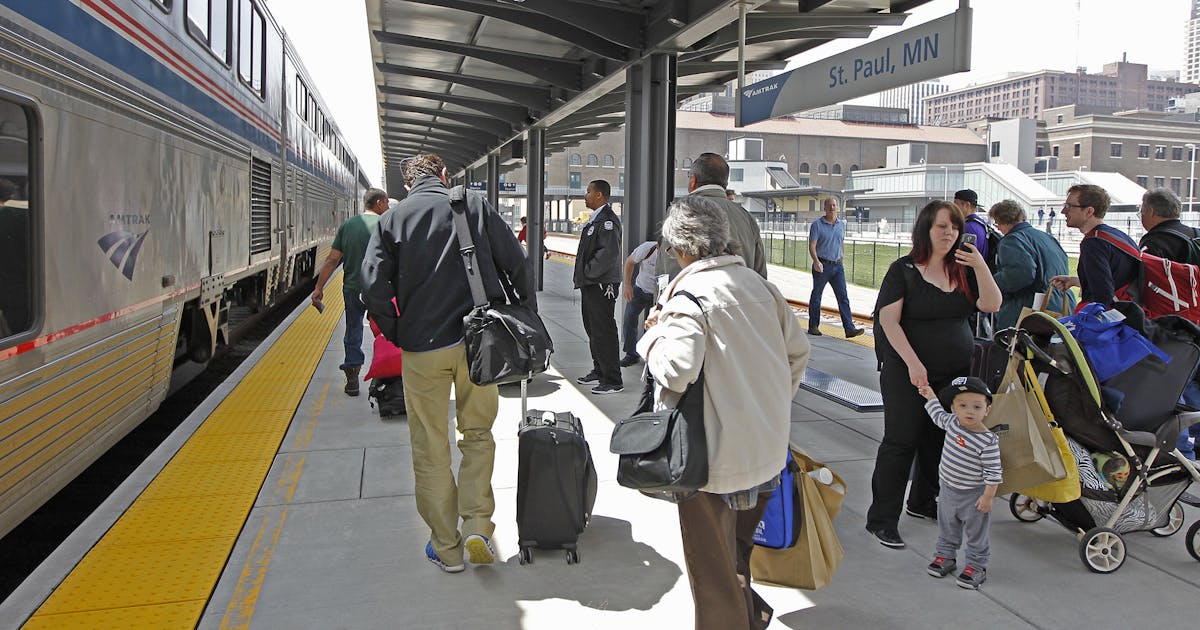Star Tribune
Amtrak debuts second train from St. Paul to Chicago on May 21

Long-awaited expanded train service on Amtrak between St. Paul’s Union Depot and downtown Chicago is slated to begin May 21.
The newly christened Borealis service will feature a midday departure from St. Paul arriving at Chicago’s Union station about 7.5 hours later. Trains will leave Chicago’s Union Station mid-morning en route to St. Paul.
The Borealis will follow the same route as the long-distance Empire Builder, which connects Chicago with Seattle and Portland, Ore., through St. Paul.
Stops in Minnesota include Red Wing and Winona, as well as service to the Wisconsin Dells, Milwaukee and Milwaukee Mitchell International Airport.
The Borealis’ coach fares begin at $41 one way between St. Paul and Chicago, slightly cheaper than airfares listed on Google Flights. Discounts are available for children ages 2 to 12, students, seniors, veterans, military personnel and their families, and groups.
“A second daily passenger rail service connecting St. Paul to Chicago via Milwaukee is a welcome addition to our transportation system, providing more choices and travel flexibility for passengers,” said Nancy Daubenberger, commissioner of the Minnesota Department of Transportation, in a news release.
The Borealis service will reach maximum speeds of 79 mph, and studies have indicated that at least 124,000 people will use the service in its first year.
Rail advocates have pushed for at least a decade to enhance train service between the Twin Cities and Chicago, especially since Empire Builder trains traveling west to St. Paul and Chicago can be delayed.
“This makes a real difference for college students, families with kids, and elderly people who really need a transportation option rather than driving and flying,” said Brian Nelson, president of the rail advocacy group All Aboard Minnesota.
The train works “for people who want room, comfort and luggage allowment, plus the ability to work, read a book and just relax and ride along the beautiful Mississippi River,” he said.
Star Tribune
St. Paul Public Schools to property raise tax levy by 7.9% in 2025

The St. Paul school board on Thursday agreed to take the district’s property tax levy to the limit once again — this time to the tune of a 7.9% increase in 2025.
The action came at the tail end of a spirited truth-in-taxation season that found homeowners venting at hearings about the high cost of government in St. Paul, and a week after the City Council voted to lower Mayor Melvin Carter’s proposed increase in the city’s share of the tax bill to 5.9%.
Jane Prince, a former City Council member, appeared before the school board earlier this month to ask members to ease the bite on homeowners. Between 2015 and 2024, she said, St. Paul Public Schools raised its levies by 50%, compared with a 39% hike in Minneapolis.
On Thursday, Tom Sager, the district’s executive chief of financial services, cautioned that a move by the board to levy taxes in an amount less than that allowed by the state Department of Education could lead to a corresponding decrease in the amount of state aid it receives in some funding categories.
Board Member Carlo Franco said Thursday he hoped that the district could one day get to the point of lowering its levy increases in response to homeowners decrying “big taxes” in St. Paul.
“Our commitment is to make sure that those ‘big taxes’ translate into big outcomes and big successes for our kids,” Franco said.
The owner of a city’s $275,300 median-valued home will see a $142 increase in the district’s share of the property tax bill, or 11.5%. Changes in individual property values, as well as levies set by the county, city and other tax bodies, are among the other factors determining one’s final overall tax bill.
Star Tribune
18-year-old from North Dakota charged in north Minneapolis shooting that killed teen girl
An 18-year-old from West Fargo, N.D., has been charged with killing a 17-year-old girl this summer in a shooting at a north Minneapolis gas station that injured another person.
Erick Corday Scott was charged Thursday in Hennepin County District Court with second-degree murder for the death of Lonnaya I’zanay Warren-Lloyd, of Minneapolis. Scott has no criminal history in Minnesota but, since turning 18 in April, he has been charged with three different crimes in North Dakota: felony conspiracy to commit robbery with a firearm; misdemeanor fleeing a police officer on foot; and unlawful possession of a firearm as a violent felon.
The firearm possession charge was filed on Dec. 12 and Scott is in custody at the Cass County jail.
Katie Nechiporenko, an assistant Cass County state’s attorney for North Dakota, said that while Scott hasn’t been convicted of a felony as an adult, he has a juvenile record that can be used to enhance adult sentencing on the most recent firearm charge.
“It’s just for certain crimes as they relate to guns,” she said. “It’s North Dakota’s carveout.” Nechiporenko said she has not been contacted by Hennepin County about the murder charge against Scott.
Messages were left with Scott’s lawyer in North Dakota. No attorney was listed for him in Hennepin County.
According to court and police documents:
Police responded to the Super USA gas station around 11 p.m. on July 7 after reports of a shooting. They found Warren-Lloyd in the front passenger seat of a parked car with multiple gunshot wounds. She was transported to North Memorial Hospital where she died.
Star Tribune
scrap parkway plan, keep I-94 between St. Paul and Minneapolis as a freeway

That rings hollow, Our Streets said
“MnDOT’s Rethinking I-94 team should be embarrassed to repeat a harmful history by removing these options without consent from those most impacted,” the Our Streets statement said. “MnDOT continues advancing plans to rebuild this emblem of white supremacy against the will of affected communities.”
In September, the Minneapolis City Council unanimously passed a resolution supporting Our Street’s push for a road with fewer lanes and the opportunity to repurpose highway land for public housing, affordable commercial space, parks, community gardens, or uses determined by surrounding communities.
The resolution asks MnDOT to “improve the Rethinking I-94 project’s evaluation criteria to more accurately measure and prioritize the impacts on adjacent neighborhoods.”
Any redo of I-94 needs to improve the ability to move goods and people through the corridor, fix aging infrastructure, address safety issues and congestion, promote better health, and enhance community and connectivity, MnDOT said.



